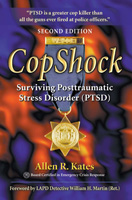
CopShock: Second Edition
Surviving Posttraumatic Stress Disorder (PTSD)
by Allen R. Kates, MFAW, BCECR
Resiliency
Being resilient means that you adapt well to adverse conditions. Many of us have a natural, some say inborn, resiliency when bad things happen. We spring back from crises. However, our upbringing, genetics, or how we’ve responded to crises in the past may determine how resilient we are in the future. Nevertheless, no matter how we presently respond to suffering or hardships, we can learn to be more resilient. We can build better coping skills.
Mayo Clinic
On the
website for the Mayor Clinic, there are excellent tips for how to build
resiliency skills. Such things as building strong relationships with family and
friends, using humor and laughter during stressful situations, building on the
skills that got you through other tough times, and maintaining perspective. The
site also discusses how resiliency offers protection from depression and PTSD.
Go to: http://www.mayoclinic.com. Type "Resilience" in the search engine and click on "Resilience: Build
Skills to Endure Hardship."
Dr. Michael
Norman
Dr. Michael Norman is a highly respected chiropractor
and speaker who takes a holistic approach to dealing with trauma and building
resiliency. On his website, he discusses how good nutrition, exercise, a finely
tuned nervous system, and a positive attitude to life help create
resiliency.
His site offers his book, Above, Down, Inside & Out,
Unleashing Your Spiritual Giant Within, that discusses the relationship
between sickness and the subluxated nervous system, among other things. His
online Resiliency Quiz is the only self-test I’ve seen that tests not only
physical and mental resiliency, but also spiritual resiliency to withstanding
life’s calamities.
Go to: http://www.DrMichaelNorman.com.
Write: 3740 N. Josey Lane, Suite 216, Carrollton, TX 75007. Phone:
972-394-3350.
Resiliency
Center
The Resiliency Center website features the work of Dr.
Al Siebert, an ex-paratrooper and internationally known researcher into the
nature of highly resilient survivors. His book The Survivor
Personality is world-renowned, and his latest book, The Resiliency
Advantage, shows how to thrive under pressure and bounce back from
setbacks.
On his website, he shares articles about how to develop
resiliency, combat stress, and offers resiliency success stories, a learning CD
course, books, videotapes, and his free e-newsletter. The website also offers a
resiliency quiz that you can fill out on the spot and receive your score.
Go to: http://www.resiliencycenter.com.
Write: The Resiliency Center, PO Box 535, Portland, OR 97207. Phone:
503-289-3295.
Trauma and Resiliency
Resources
Dr. Eva Usadi is a New York City psychotherapist in
practice for more than twenty years who helps people affected by acute and
posttraumatic stress and anxiety disorders, which includes PTSD. On September
11th, 2001, she was among the first clinicians to report for duty, organizing
support services for those searching for loved ones. As a member of the Red
Cross Disaster Mental Health Team, she assisted people at the Armory, and was
then deployed to Ground Zero where she counseled rescue/recovery workers for
three months. She has continued to work with first responders in her private
office in Manhattan. She is now helping returning troops from Iraq and
Afghanistan with PTSD symptoms.
On her website, she features articles for
first responders and troops, and also offers links to helpful websites.
Go
to: http://www.traumaandresiliencyresources.org. Write: Dr. Eva Usadi, Trauma and Resiliency Resources,
Inc., 16 West 9th Street, Suite 5E, New York, NY 10011. Phone: 212-532-6574.